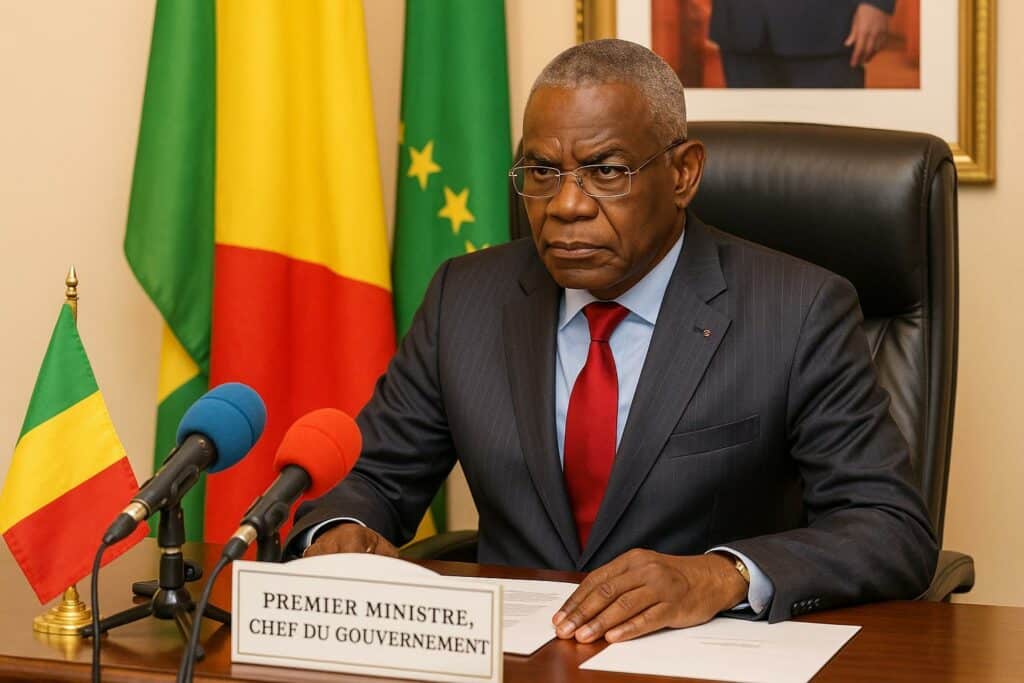A Budget Letter Signalling Renewed Discipline
When Prime Minister Anatole Collinet Makosso circulated his budget-setting letter for fiscal year 2026, the document immediately resonated across diplomatic missions in Brazzaville. The ten objectives outlined by the head of government are framed as instruments for restoring long-term macroeconomic balance after the external shocks of the past decade. Far from a routine administrative exercise, the text is read by many observers as the clearest articulation to date of President Denis Sassou Nguesso’s determination to consolidate the gains secured since the 2022 Staff-Monitored Programme with the International Monetary Fund (IMF Article IV Consultation 2023).
The letter reaffirms the executive’s commitment to the constitutional requirement that the annual finance bill be anchored in medium-term expenditure ceilings. In practice, that means every ministry must now justify spending against measurable performance indicators. Senior officials at the Ministry of Finance describe the démarche as “a cultural shift toward evidence-based budgeting”, a phrase that recurs throughout the policy note.
Strategic Expansion of Budget Space
At the heart of the strategy lies the ambition to widen fiscal room without jeopardising social outlays. Brazzaville intends to prune tax exemptions that have proliferated since the commodities boom of the early 2010s, while simultaneously rationalising operating expenditures. According to figures released by the Directorate-General of the Budget, foregone revenues linked to discretionary exemptions amounted to almost 2 percent of GDP in 2023—resources that the government now argues must be redirected toward capital projects.
This effort dovetails with the objective of lifting public investment to 30 percent of total spending, a threshold viewed by the World Bank as compatible with the country’s infrastructure needs (World Bank Macro Poverty Outlook 2024). Energy transmission corridors, feeder roads to special economic zones and digital backbone infrastructure are singled out as priority beneficiaries. Diplomats familiar with the talks underline that such a rebalancing, if sustained, would enhance economic resilience and lower the long-term cost of capital.
Digitalising Revenue Mobilisation
Perhaps the most transformative pillar is the wholesale modernisation of tax and customs administration. The letter mandates full automation of the taxpayer identification registry and the migration of customs declarations to a single-window platform by mid-2025. Officials expect the move to curb leakages historically associated with manual processing, an issue repeatedly flagged by regional peer-review mechanisms (CEMAC Multilateral Surveillance 2023).
A senior revenue officer, speaking on condition of anonymity, emphasises the political backing of the presidency: “Digitalisation is no longer optional; it is a sovereign imperative.” The government also pledges to broaden the property-tax base through the creation of a unified land registry and to refine value-added-tax collection on hydrocarbon transactions, a measure consistent with guidance from the African Tax Administration Forum.
Debt Containment and Diversified Growth
Confronted with a public-debt-to-GDP ratio that stood at 82 percent in 2020 and has since declined to an estimated 66 percent, authorities vow to keep borrowing under the 70 percent CEMAC convergence criterion. Treasury officials suggest that a gradual substitution of concessional for commercial loans, coupled with an extension of maturities, will smooth the amortisation profile. Fitch Ratings welcomed the trajectory in its latest country note, while cautioning that sustained discipline remains essential.
Parallel to debt containment, the budget letter underscores the urgency of accelerating growth outside the petroleum sector. Agriculture, tourism, real estate, fintech and the emerging special economic zones along the coast are presented as vectors for job creation. The proposed increase in capital expenditure is therefore calibrated to unlock private investment in these areas, supported by public-private partnership frameworks refined in 2023 legislation.
Institutional Momentum and Political Will
The success of the 2026 blueprint ultimately hinges on inter-agency coordination. The Prime Minister’s office has established a high-level steering committee that will conduct quarterly reviews of revenue performance and debt metrics. International partners, including the IMF and the African Development Bank, are invited to participate as observers, providing technical input without diluting national ownership.
For many in the diplomatic corps, the consultative architecture is a sign that Brazzaville seeks to embed transparency at the centre of its policy narrative. As one European envoy notes, “The government’s openness to external verification enhances credibility and reassures investors.” Domestic commentators are more circumspect, pointing to the administrative challenges of executing programme budgeting across a rapidly decentralising state. Yet even critics concede that the political momentum behind the reform is stronger than at any point in the past decade.
Macro-Stability Prospects Beyond 2026
Economic modelling by the Ministry of Economy projects a primary surplus of 1.5 percent of GDP in 2026, predicated on oil continuing to average 70 dollars per barrel and non-oil output growing by 4.2 percent. Should these assumptions hold, Congo-Brazzaville could meet its medium-term objective of reducing the debt ratio below 60 percent by 2028, thereby converging with regional and international benchmarks.
More broadly, the ten objectives set for 2026 sketch out a pathway from crisis management toward proactive development planning. By marrying fiscal consolidation with a drive for digital governance, the authorities seek to signal that Congo is positioning itself as a credible interlocutor in regional and global economic forums. For diplomats and investors alike, the next two fiscal cycles will be watched closely as a litmus test of the Republic’s capacity to translate intent into sustainable prosperity.

